Reflective Journal on Employability Skills: Task 2 Analysis
VerifiedAdded on 2022/12/23
|7
|1832
|45
Journal and Reflective Writing
AI Summary
This reflective journal, completed as Task 2, provides a detailed self-assessment of employability and study skills using the Gibbs Reflective Cycle. The student reflects on their experiences throughout a module, focusing on skills such as teamwork, research, communication, and time management. The journal includes a description of the experiences, the feelings associated with them, an evaluation of strengths and weaknesses, an analysis of the skills in relation to Belbin's theory, a conclusion summarizing key learnings, and an action plan for future skill development. The student identifies strengths in communication, research, and ICT skills, while acknowledging areas for improvement in teamwork, time management, and problem-solving skills. The action plan focuses on improving time management and problem-solving abilities through specific strategies. This reflective piece demonstrates a critical understanding of personal and professional development.
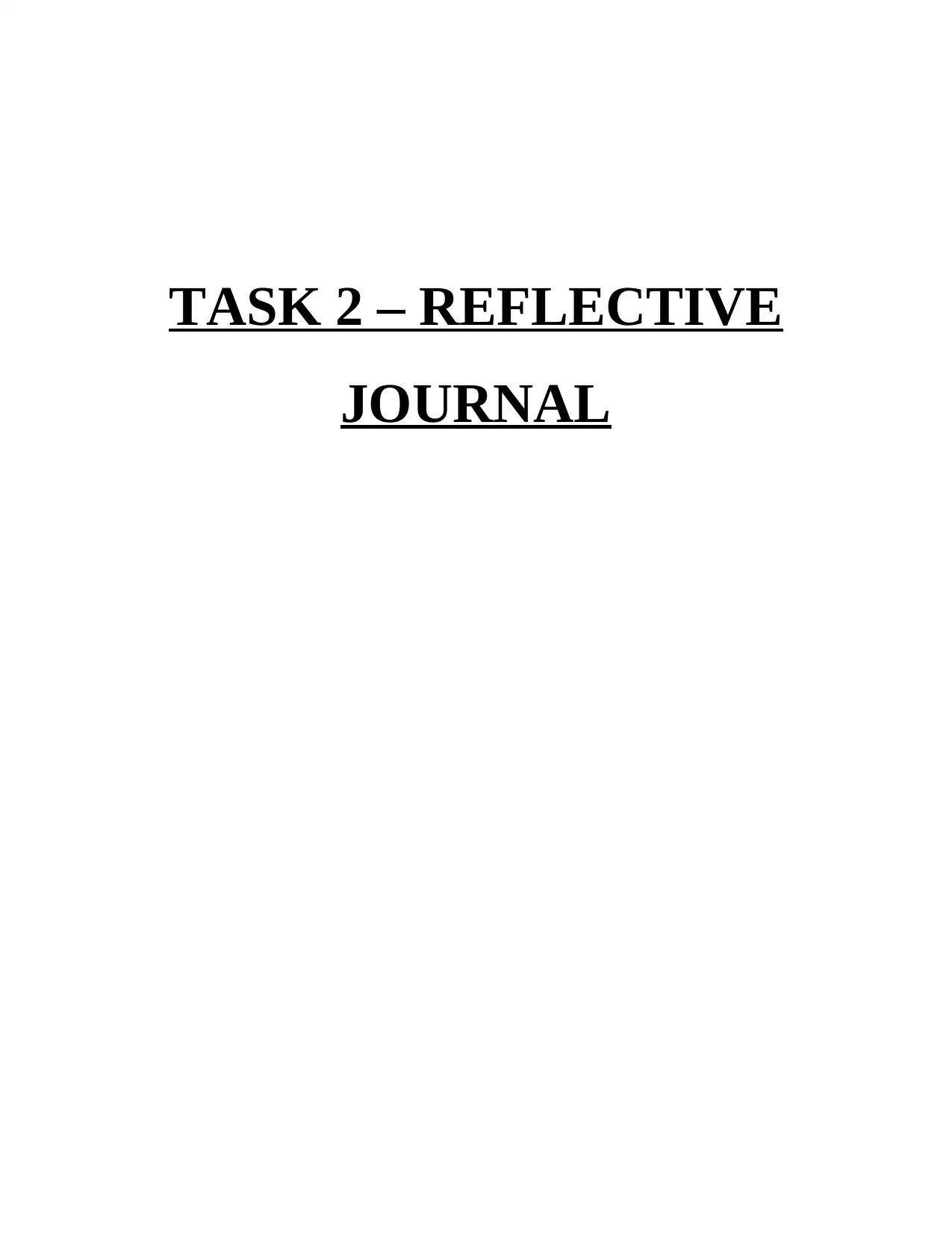
TASK 2 – REFLECTIVE
JOURNAL
JOURNAL
Paraphrase This Document
Need a fresh take? Get an instant paraphrase of this document with our AI Paraphraser
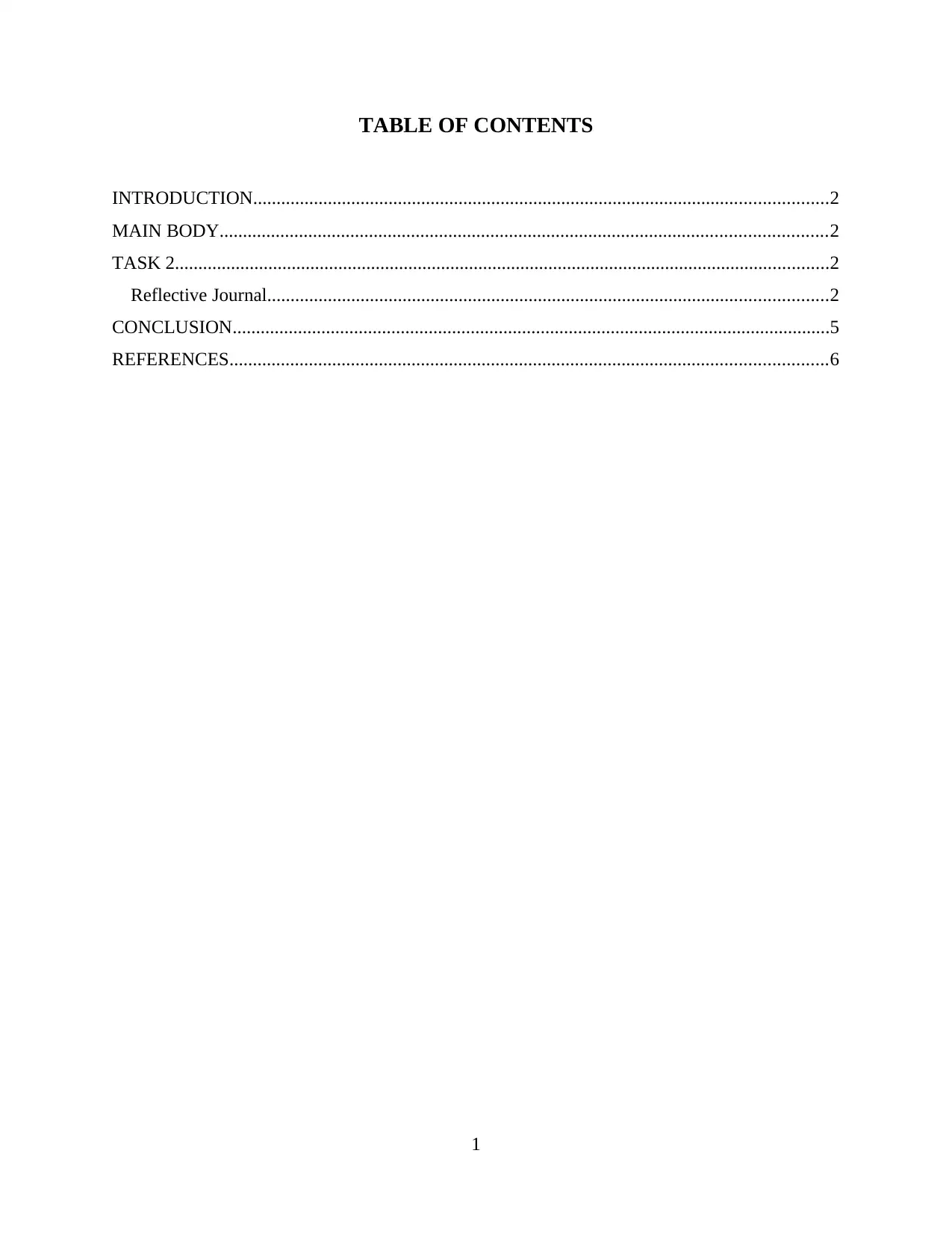
TABLE OF CONTENTS
INTRODUCTION...........................................................................................................................2
MAIN BODY..................................................................................................................................2
TASK 2............................................................................................................................................2
Reflective Journal........................................................................................................................2
CONCLUSION................................................................................................................................5
REFERENCES................................................................................................................................6
1
INTRODUCTION...........................................................................................................................2
MAIN BODY..................................................................................................................................2
TASK 2............................................................................................................................................2
Reflective Journal........................................................................................................................2
CONCLUSION................................................................................................................................5
REFERENCES................................................................................................................................6
1
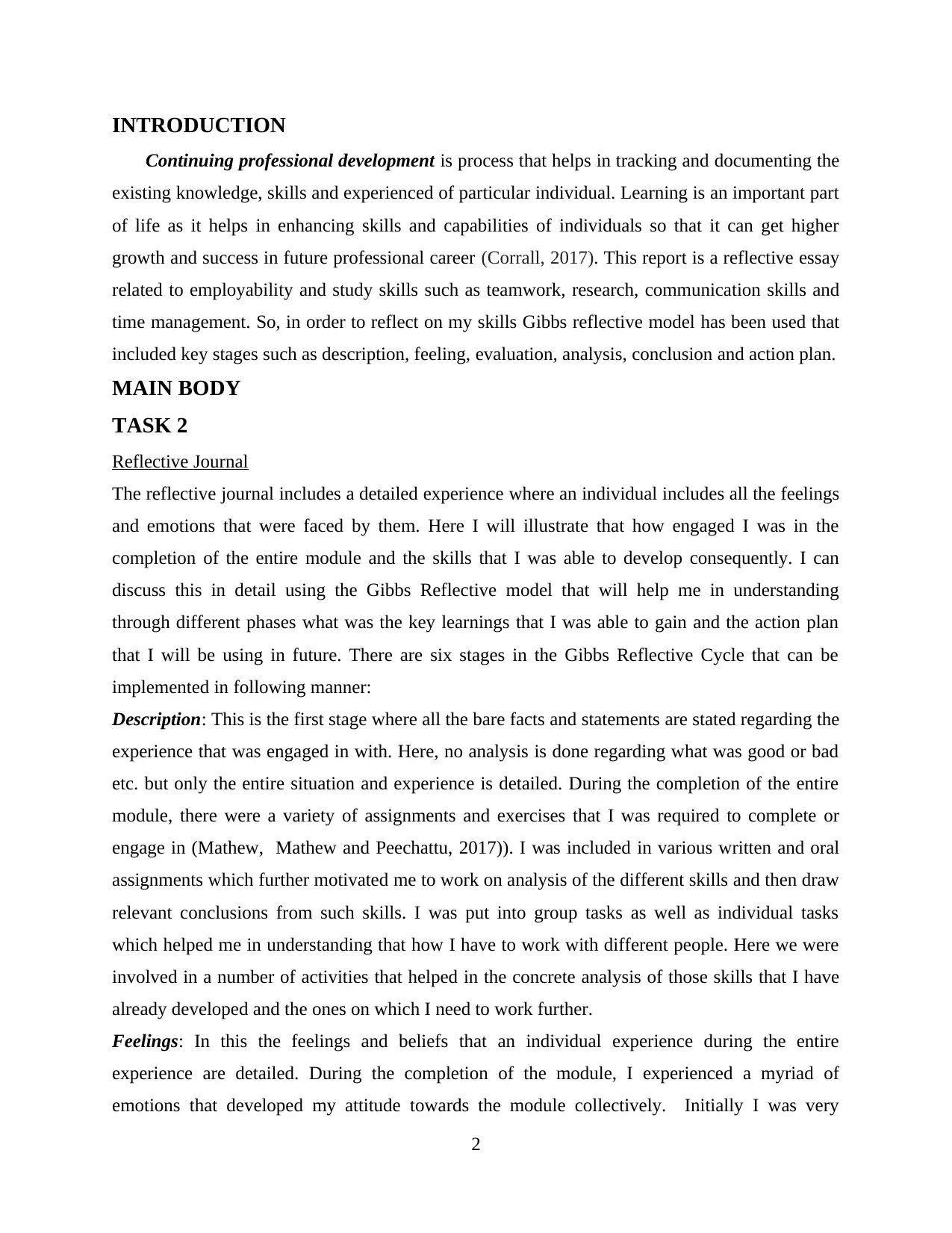
INTRODUCTION
Continuing professional development is process that helps in tracking and documenting the
existing knowledge, skills and experienced of particular individual. Learning is an important part
of life as it helps in enhancing skills and capabilities of individuals so that it can get higher
growth and success in future professional career (Corrall, 2017). This report is a reflective essay
related to employability and study skills such as teamwork, research, communication skills and
time management. So, in order to reflect on my skills Gibbs reflective model has been used that
included key stages such as description, feeling, evaluation, analysis, conclusion and action plan.
MAIN BODY
TASK 2
Reflective Journal
The reflective journal includes a detailed experience where an individual includes all the feelings
and emotions that were faced by them. Here I will illustrate that how engaged I was in the
completion of the entire module and the skills that I was able to develop consequently. I can
discuss this in detail using the Gibbs Reflective model that will help me in understanding
through different phases what was the key learnings that I was able to gain and the action plan
that I will be using in future. There are six stages in the Gibbs Reflective Cycle that can be
implemented in following manner:
Description: This is the first stage where all the bare facts and statements are stated regarding the
experience that was engaged in with. Here, no analysis is done regarding what was good or bad
etc. but only the entire situation and experience is detailed. During the completion of the entire
module, there were a variety of assignments and exercises that I was required to complete or
engage in (Mathew, Mathew and Peechattu, 2017)). I was included in various written and oral
assignments which further motivated me to work on analysis of the different skills and then draw
relevant conclusions from such skills. I was put into group tasks as well as individual tasks
which helped me in understanding that how I have to work with different people. Here we were
involved in a number of activities that helped in the concrete analysis of those skills that I have
already developed and the ones on which I need to work further.
Feelings: In this the feelings and beliefs that an individual experience during the entire
experience are detailed. During the completion of the module, I experienced a myriad of
emotions that developed my attitude towards the module collectively. Initially I was very
2
Continuing professional development is process that helps in tracking and documenting the
existing knowledge, skills and experienced of particular individual. Learning is an important part
of life as it helps in enhancing skills and capabilities of individuals so that it can get higher
growth and success in future professional career (Corrall, 2017). This report is a reflective essay
related to employability and study skills such as teamwork, research, communication skills and
time management. So, in order to reflect on my skills Gibbs reflective model has been used that
included key stages such as description, feeling, evaluation, analysis, conclusion and action plan.
MAIN BODY
TASK 2
Reflective Journal
The reflective journal includes a detailed experience where an individual includes all the feelings
and emotions that were faced by them. Here I will illustrate that how engaged I was in the
completion of the entire module and the skills that I was able to develop consequently. I can
discuss this in detail using the Gibbs Reflective model that will help me in understanding
through different phases what was the key learnings that I was able to gain and the action plan
that I will be using in future. There are six stages in the Gibbs Reflective Cycle that can be
implemented in following manner:
Description: This is the first stage where all the bare facts and statements are stated regarding the
experience that was engaged in with. Here, no analysis is done regarding what was good or bad
etc. but only the entire situation and experience is detailed. During the completion of the entire
module, there were a variety of assignments and exercises that I was required to complete or
engage in (Mathew, Mathew and Peechattu, 2017)). I was included in various written and oral
assignments which further motivated me to work on analysis of the different skills and then draw
relevant conclusions from such skills. I was put into group tasks as well as individual tasks
which helped me in understanding that how I have to work with different people. Here we were
involved in a number of activities that helped in the concrete analysis of those skills that I have
already developed and the ones on which I need to work further.
Feelings: In this the feelings and beliefs that an individual experience during the entire
experience are detailed. During the completion of the module, I experienced a myriad of
emotions that developed my attitude towards the module collectively. Initially I was very
2
⊘ This is a preview!⊘
Do you want full access?
Subscribe today to unlock all pages.

Trusted by 1+ million students worldwide
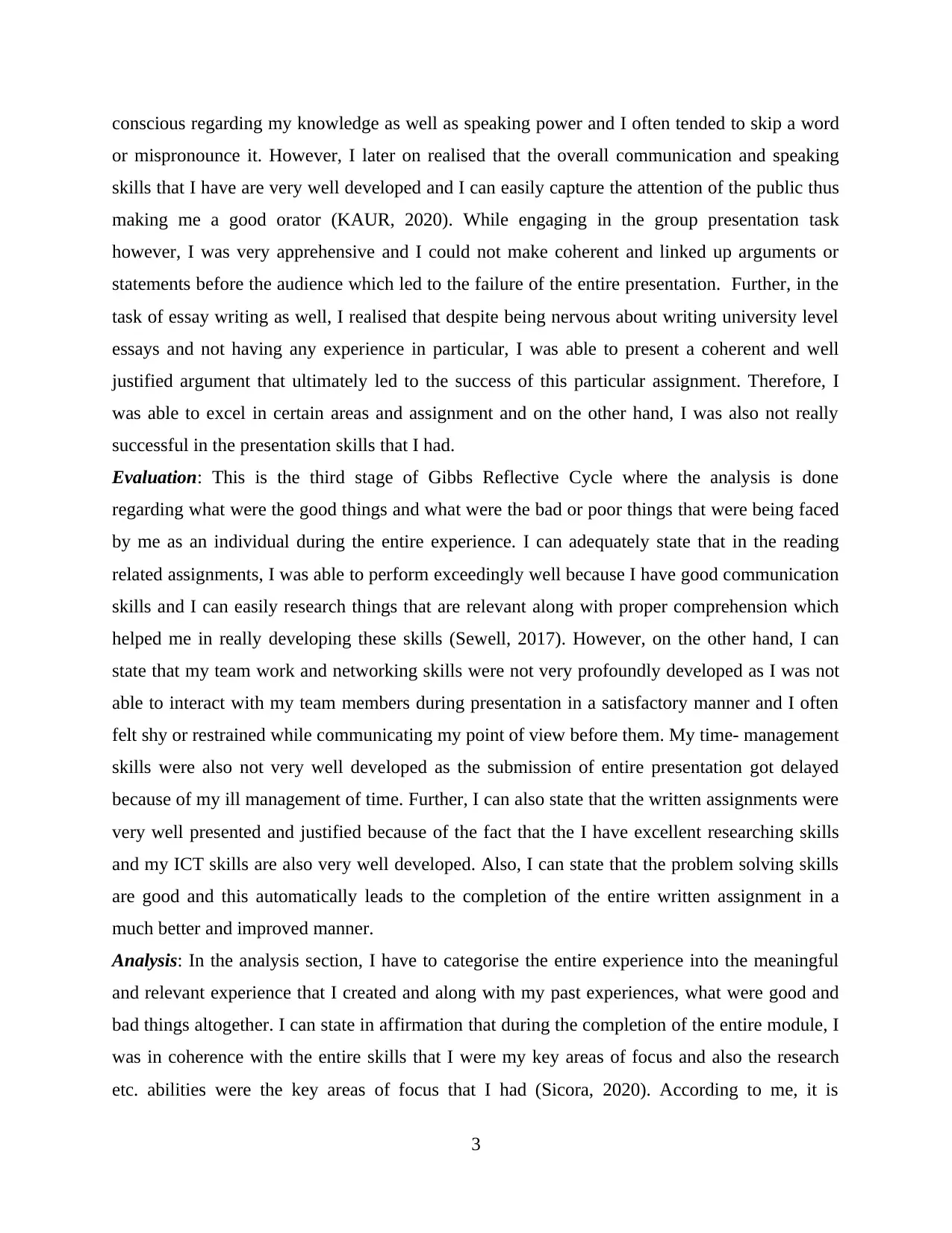
conscious regarding my knowledge as well as speaking power and I often tended to skip a word
or mispronounce it. However, I later on realised that the overall communication and speaking
skills that I have are very well developed and I can easily capture the attention of the public thus
making me a good orator (KAUR, 2020). While engaging in the group presentation task
however, I was very apprehensive and I could not make coherent and linked up arguments or
statements before the audience which led to the failure of the entire presentation. Further, in the
task of essay writing as well, I realised that despite being nervous about writing university level
essays and not having any experience in particular, I was able to present a coherent and well
justified argument that ultimately led to the success of this particular assignment. Therefore, I
was able to excel in certain areas and assignment and on the other hand, I was also not really
successful in the presentation skills that I had.
Evaluation: This is the third stage of Gibbs Reflective Cycle where the analysis is done
regarding what were the good things and what were the bad or poor things that were being faced
by me as an individual during the entire experience. I can adequately state that in the reading
related assignments, I was able to perform exceedingly well because I have good communication
skills and I can easily research things that are relevant along with proper comprehension which
helped me in really developing these skills (Sewell, 2017). However, on the other hand, I can
state that my team work and networking skills were not very profoundly developed as I was not
able to interact with my team members during presentation in a satisfactory manner and I often
felt shy or restrained while communicating my point of view before them. My time- management
skills were also not very well developed as the submission of entire presentation got delayed
because of my ill management of time. Further, I can also state that the written assignments were
very well presented and justified because of the fact that the I have excellent researching skills
and my ICT skills are also very well developed. Also, I can state that the problem solving skills
are good and this automatically leads to the completion of the entire written assignment in a
much better and improved manner.
Analysis: In the analysis section, I have to categorise the entire experience into the meaningful
and relevant experience that I created and along with my past experiences, what were good and
bad things altogether. I can state in affirmation that during the completion of the entire module, I
was in coherence with the entire skills that I were my key areas of focus and also the research
etc. abilities were the key areas of focus that I had (Sicora, 2020). According to me, it is
3
or mispronounce it. However, I later on realised that the overall communication and speaking
skills that I have are very well developed and I can easily capture the attention of the public thus
making me a good orator (KAUR, 2020). While engaging in the group presentation task
however, I was very apprehensive and I could not make coherent and linked up arguments or
statements before the audience which led to the failure of the entire presentation. Further, in the
task of essay writing as well, I realised that despite being nervous about writing university level
essays and not having any experience in particular, I was able to present a coherent and well
justified argument that ultimately led to the success of this particular assignment. Therefore, I
was able to excel in certain areas and assignment and on the other hand, I was also not really
successful in the presentation skills that I had.
Evaluation: This is the third stage of Gibbs Reflective Cycle where the analysis is done
regarding what were the good things and what were the bad or poor things that were being faced
by me as an individual during the entire experience. I can adequately state that in the reading
related assignments, I was able to perform exceedingly well because I have good communication
skills and I can easily research things that are relevant along with proper comprehension which
helped me in really developing these skills (Sewell, 2017). However, on the other hand, I can
state that my team work and networking skills were not very profoundly developed as I was not
able to interact with my team members during presentation in a satisfactory manner and I often
felt shy or restrained while communicating my point of view before them. My time- management
skills were also not very well developed as the submission of entire presentation got delayed
because of my ill management of time. Further, I can also state that the written assignments were
very well presented and justified because of the fact that the I have excellent researching skills
and my ICT skills are also very well developed. Also, I can state that the problem solving skills
are good and this automatically leads to the completion of the entire written assignment in a
much better and improved manner.
Analysis: In the analysis section, I have to categorise the entire experience into the meaningful
and relevant experience that I created and along with my past experiences, what were good and
bad things altogether. I can state in affirmation that during the completion of the entire module, I
was in coherence with the entire skills that I were my key areas of focus and also the research
etc. abilities were the key areas of focus that I had (Sicora, 2020). According to me, it is
3
Paraphrase This Document
Need a fresh take? Get an instant paraphrase of this document with our AI Paraphraser
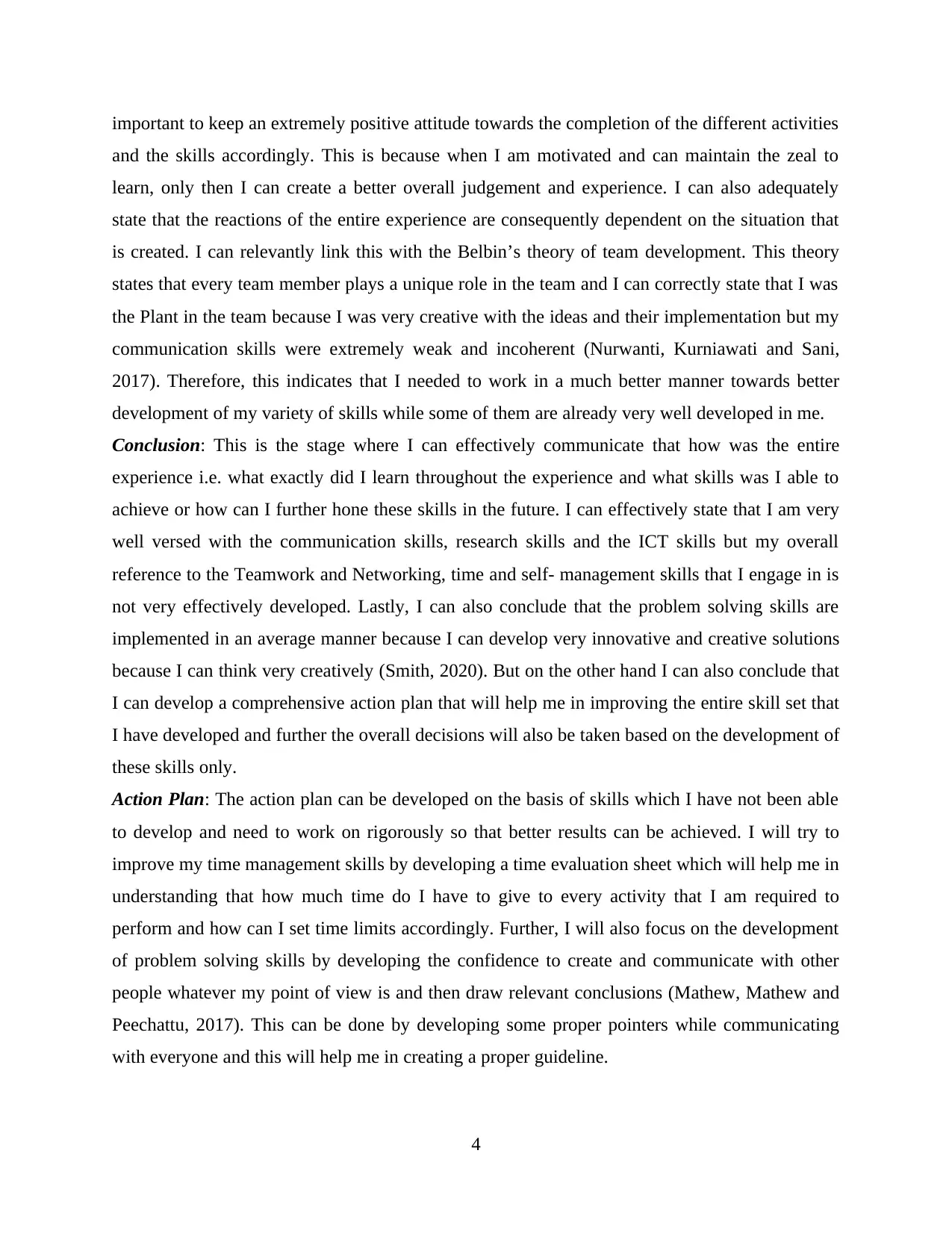
important to keep an extremely positive attitude towards the completion of the different activities
and the skills accordingly. This is because when I am motivated and can maintain the zeal to
learn, only then I can create a better overall judgement and experience. I can also adequately
state that the reactions of the entire experience are consequently dependent on the situation that
is created. I can relevantly link this with the Belbin’s theory of team development. This theory
states that every team member plays a unique role in the team and I can correctly state that I was
the Plant in the team because I was very creative with the ideas and their implementation but my
communication skills were extremely weak and incoherent (Nurwanti, Kurniawati and Sani,
2017). Therefore, this indicates that I needed to work in a much better manner towards better
development of my variety of skills while some of them are already very well developed in me.
Conclusion: This is the stage where I can effectively communicate that how was the entire
experience i.e. what exactly did I learn throughout the experience and what skills was I able to
achieve or how can I further hone these skills in the future. I can effectively state that I am very
well versed with the communication skills, research skills and the ICT skills but my overall
reference to the Teamwork and Networking, time and self- management skills that I engage in is
not very effectively developed. Lastly, I can also conclude that the problem solving skills are
implemented in an average manner because I can develop very innovative and creative solutions
because I can think very creatively (Smith, 2020). But on the other hand I can also conclude that
I can develop a comprehensive action plan that will help me in improving the entire skill set that
I have developed and further the overall decisions will also be taken based on the development of
these skills only.
Action Plan: The action plan can be developed on the basis of skills which I have not been able
to develop and need to work on rigorously so that better results can be achieved. I will try to
improve my time management skills by developing a time evaluation sheet which will help me in
understanding that how much time do I have to give to every activity that I am required to
perform and how can I set time limits accordingly. Further, I will also focus on the development
of problem solving skills by developing the confidence to create and communicate with other
people whatever my point of view is and then draw relevant conclusions (Mathew, Mathew and
Peechattu, 2017). This can be done by developing some proper pointers while communicating
with everyone and this will help me in creating a proper guideline.
4
and the skills accordingly. This is because when I am motivated and can maintain the zeal to
learn, only then I can create a better overall judgement and experience. I can also adequately
state that the reactions of the entire experience are consequently dependent on the situation that
is created. I can relevantly link this with the Belbin’s theory of team development. This theory
states that every team member plays a unique role in the team and I can correctly state that I was
the Plant in the team because I was very creative with the ideas and their implementation but my
communication skills were extremely weak and incoherent (Nurwanti, Kurniawati and Sani,
2017). Therefore, this indicates that I needed to work in a much better manner towards better
development of my variety of skills while some of them are already very well developed in me.
Conclusion: This is the stage where I can effectively communicate that how was the entire
experience i.e. what exactly did I learn throughout the experience and what skills was I able to
achieve or how can I further hone these skills in the future. I can effectively state that I am very
well versed with the communication skills, research skills and the ICT skills but my overall
reference to the Teamwork and Networking, time and self- management skills that I engage in is
not very effectively developed. Lastly, I can also conclude that the problem solving skills are
implemented in an average manner because I can develop very innovative and creative solutions
because I can think very creatively (Smith, 2020). But on the other hand I can also conclude that
I can develop a comprehensive action plan that will help me in improving the entire skill set that
I have developed and further the overall decisions will also be taken based on the development of
these skills only.
Action Plan: The action plan can be developed on the basis of skills which I have not been able
to develop and need to work on rigorously so that better results can be achieved. I will try to
improve my time management skills by developing a time evaluation sheet which will help me in
understanding that how much time do I have to give to every activity that I am required to
perform and how can I set time limits accordingly. Further, I will also focus on the development
of problem solving skills by developing the confidence to create and communicate with other
people whatever my point of view is and then draw relevant conclusions (Mathew, Mathew and
Peechattu, 2017). This can be done by developing some proper pointers while communicating
with everyone and this will help me in creating a proper guideline.
4
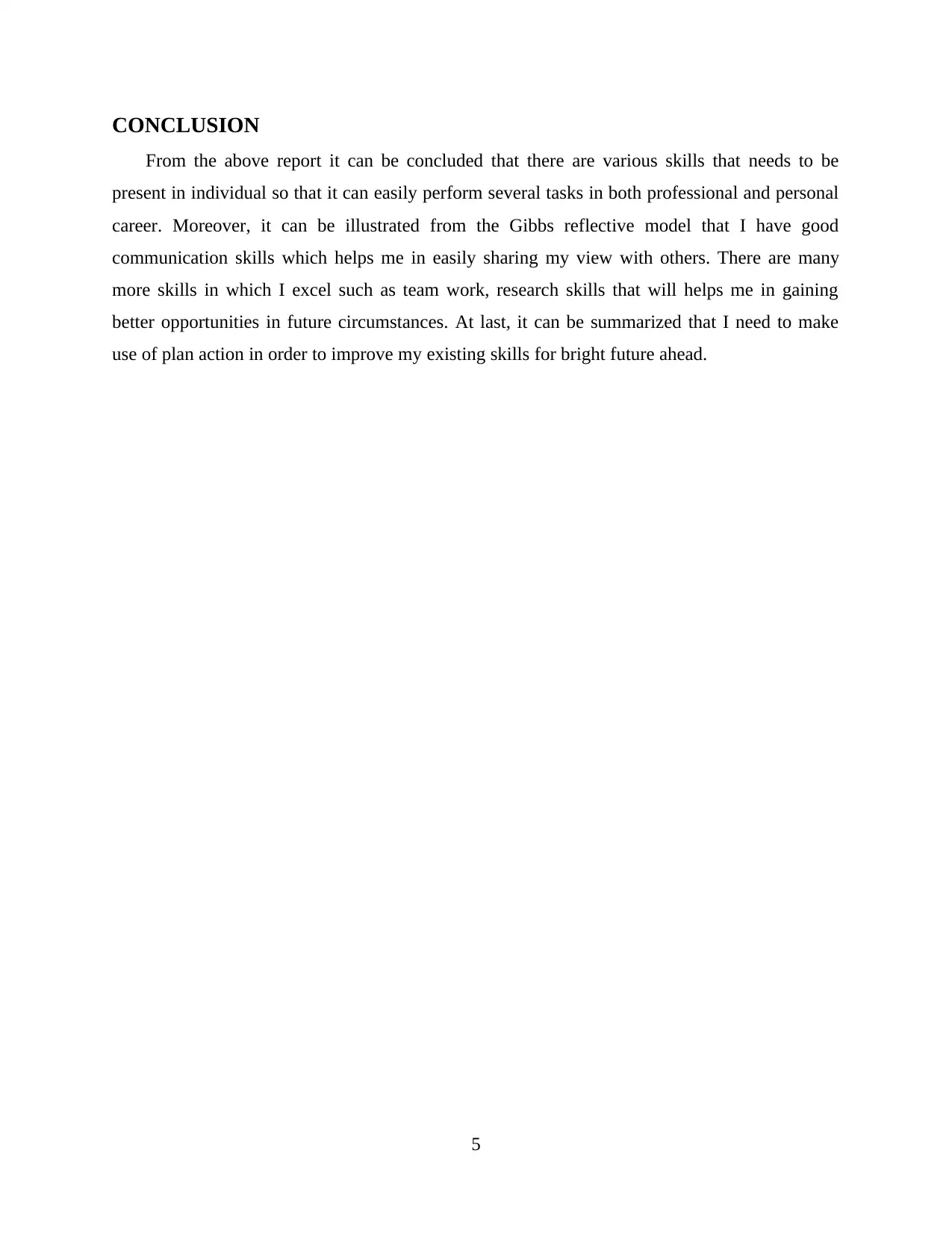
CONCLUSION
From the above report it can be concluded that there are various skills that needs to be
present in individual so that it can easily perform several tasks in both professional and personal
career. Moreover, it can be illustrated from the Gibbs reflective model that I have good
communication skills which helps me in easily sharing my view with others. There are many
more skills in which I excel such as team work, research skills that will helps me in gaining
better opportunities in future circumstances. At last, it can be summarized that I need to make
use of plan action in order to improve my existing skills for bright future ahead.
5
From the above report it can be concluded that there are various skills that needs to be
present in individual so that it can easily perform several tasks in both professional and personal
career. Moreover, it can be illustrated from the Gibbs reflective model that I have good
communication skills which helps me in easily sharing my view with others. There are many
more skills in which I excel such as team work, research skills that will helps me in gaining
better opportunities in future circumstances. At last, it can be summarized that I need to make
use of plan action in order to improve my existing skills for bright future ahead.
5
⊘ This is a preview!⊘
Do you want full access?
Subscribe today to unlock all pages.

Trusted by 1+ million students worldwide
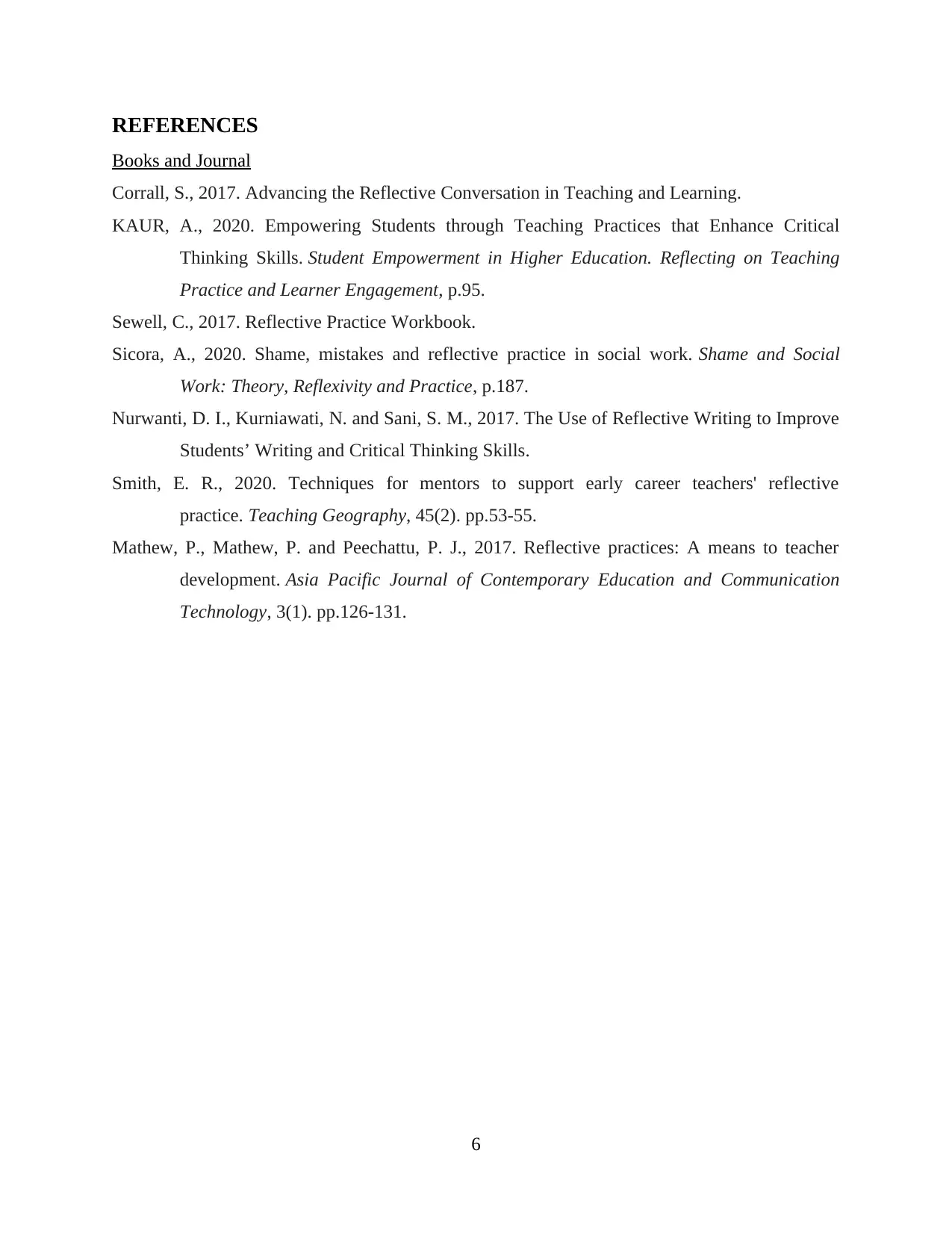
REFERENCES
Books and Journal
Corrall, S., 2017. Advancing the Reflective Conversation in Teaching and Learning.
KAUR, A., 2020. Empowering Students through Teaching Practices that Enhance Critical
Thinking Skills. Student Empowerment in Higher Education. Reflecting on Teaching
Practice and Learner Engagement, p.95.
Sewell, C., 2017. Reflective Practice Workbook.
Sicora, A., 2020. Shame, mistakes and reflective practice in social work. Shame and Social
Work: Theory, Reflexivity and Practice, p.187.
Nurwanti, D. I., Kurniawati, N. and Sani, S. M., 2017. The Use of Reflective Writing to Improve
Students’ Writing and Critical Thinking Skills.
Smith, E. R., 2020. Techniques for mentors to support early career teachers' reflective
practice. Teaching Geography, 45(2). pp.53-55.
Mathew, P., Mathew, P. and Peechattu, P. J., 2017. Reflective practices: A means to teacher
development. Asia Pacific Journal of Contemporary Education and Communication
Technology, 3(1). pp.126-131.
6
Books and Journal
Corrall, S., 2017. Advancing the Reflective Conversation in Teaching and Learning.
KAUR, A., 2020. Empowering Students through Teaching Practices that Enhance Critical
Thinking Skills. Student Empowerment in Higher Education. Reflecting on Teaching
Practice and Learner Engagement, p.95.
Sewell, C., 2017. Reflective Practice Workbook.
Sicora, A., 2020. Shame, mistakes and reflective practice in social work. Shame and Social
Work: Theory, Reflexivity and Practice, p.187.
Nurwanti, D. I., Kurniawati, N. and Sani, S. M., 2017. The Use of Reflective Writing to Improve
Students’ Writing and Critical Thinking Skills.
Smith, E. R., 2020. Techniques for mentors to support early career teachers' reflective
practice. Teaching Geography, 45(2). pp.53-55.
Mathew, P., Mathew, P. and Peechattu, P. J., 2017. Reflective practices: A means to teacher
development. Asia Pacific Journal of Contemporary Education and Communication
Technology, 3(1). pp.126-131.
6
1 out of 7
Related Documents
Your All-in-One AI-Powered Toolkit for Academic Success.
+13062052269
info@desklib.com
Available 24*7 on WhatsApp / Email
![[object Object]](/_next/static/media/star-bottom.7253800d.svg)
Unlock your academic potential
Copyright © 2020–2026 A2Z Services. All Rights Reserved. Developed and managed by ZUCOL.





